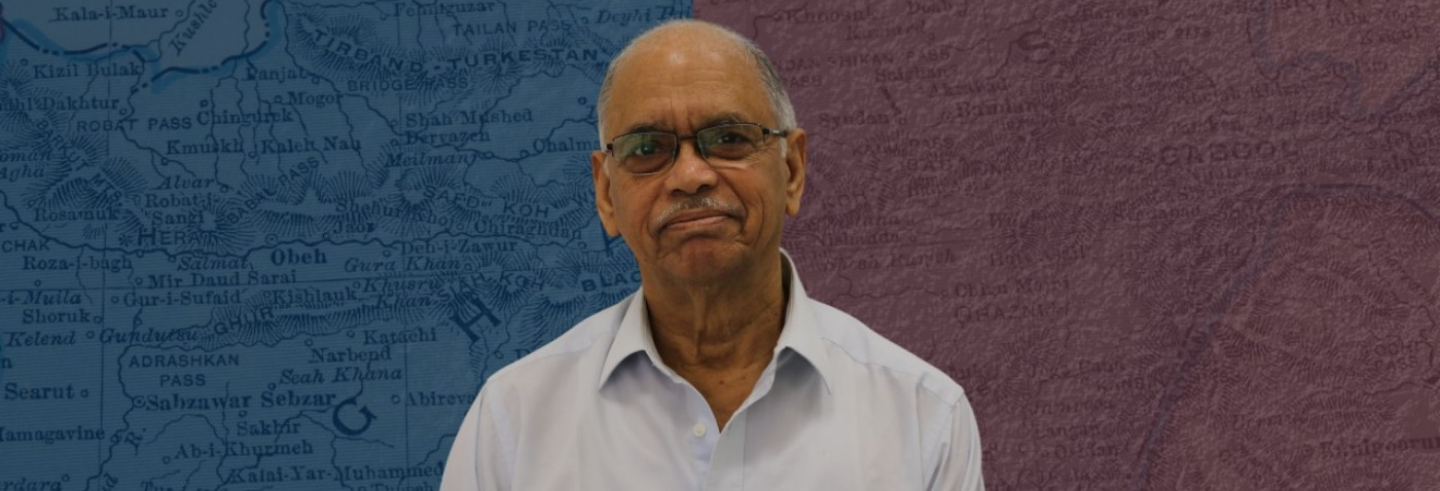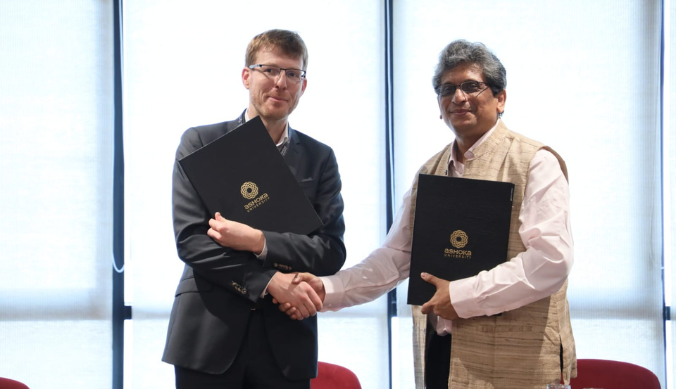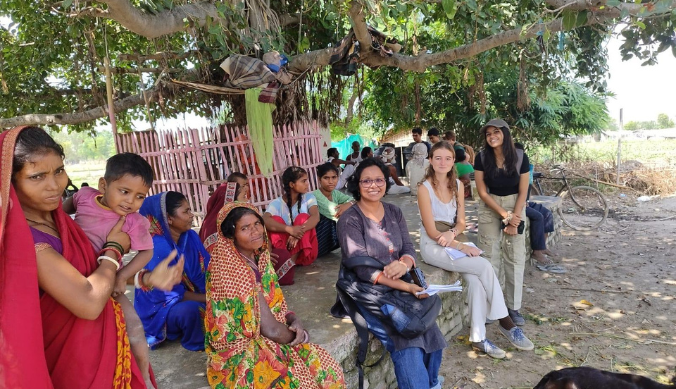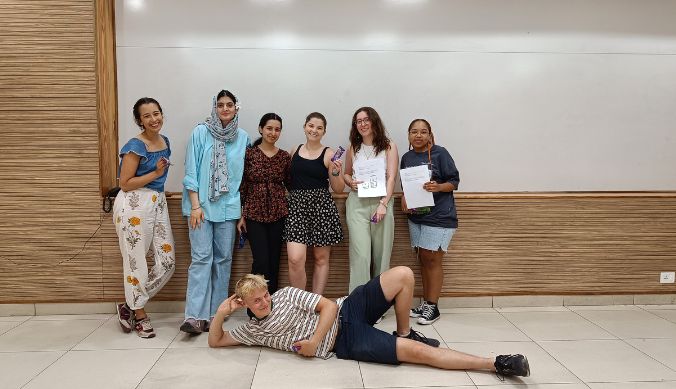The Geopolitical Hyperbole: Nayan Chanda talks about the present situation in international diplomacy in the wake of the Afghanistan crisis
In conversation with the noted journalist and author Nayan Chanda, Associate Professor of International Relations, Ashoka University.

Office of PR & Communications
10 October, 2021 | 4m readAugust 2021 faced one of the gravest tragedies in international politics. Afghanistan’s capital Kabul fell at the hands of the Taliban forces when they took control of the city during a military offensive coup that began in May 2021, thus cementing the final collapse of the 20-year long western mission in a single day. The capture took place hours after Afghan President Ashraf Ghani fled sending the country into a complete frenzy. Surprise, panic and fateful choices: this was the day when America lost its longest war (of almost $2 trillion).
Following this, the world witnessed a rising humanitarian crisis, with pictures and videos of thousands of people desperate to escape flooding the airport runway or clinging onto airplanes, erupting into complete chaos of exponential tragedy. Almost 2 weeks after the fateful day, two suicide bombers and gunmen attacked the crowds of Afghans flocking to Kabul’s airport and killing as many as 60 Afghan people and 13 US soldiers completely changing the scenes of desperation into a scene of horror. The next few days would be equally scary as a US drone strike in Kabul killed 10 innocent civilians.

The following days to come would send the country into a further jeopardy. The Taliban formed an all-male government and started imposing various other stringent rules that would further validate the question of the situation of women and girls in the country, completely disregarding even fundamental human rights. No government has officially recognised the Taliban takeover. The recently concluded 76th session of the UN General Assembly (UNGA 76) saw a decision of the world powers vowing to press for an inclusive government to be formed in Afghanistan.
German Foreign Minister Heiko Maas, addressing the G20 said, “The announcement of a non-inclusive government was a tactical mistake by the Taliban, as it will make it harder for us to engage with them.”
United Nations Secretary-General Antonio Guterres told reporters after the meeting during the annual General Assembly that the Security Council powers all want “a peaceful and stable Afghanistan where humanitarian aid can be distributed without problems and without discrimination.” They seek “an Afghanistan where the rights of women and girl are respected, an Afghanistan that is not a sanctuary for terrorism, an Afghanistan with an inclusive government representing all sections of the population,” he further added.
Regarding this, I interviewed the noted journalist and founding editor-in-chief of YaleGlobal Online, Nayan Chanda, Associate Professor of International Relations, Ashoka University. Chanda is also the author of half a dozen books including critically acclaimed Brother Enemy: The War After the War and Bound Together: How Traders, Preachers, Adventurers and Warriors Shaped Globalization. He also served as the only Asian editor for the Far Eastern Economic Review (FEER), a former Hong Kong-based English language Asian newsmagazine. During the Vietnam War in 1975, Chanda was the Saigon Correspondent for FEER. In a news piece titled “The last word from Saigon” published on April 30, 1975 revealed how Chanda was one of the few correspondents who chose to remain in the South Vietnamese capital till the very end to witness firsthand as the glaring historical chapters unfolded with the American defeat. Fast forward to today, with the fall of Kabul, the question of similarity between the two incidents has been talked about.
From assessing both situations to US foreign policy and the changing discourse of international diplomacy in the wake of the Afghanistan crisis and what all this means for India – Chanda touched upon many critical issues currently unfolding in the world.
You were the Saigon Correspondent for the Far Eastern Economic Review during the fall of Saigon in the Vietnam War in 1975. In August 2021, the world witnessed the fall of Afghanistan. Can we say there seems to be an uncanny similarity between the two historical incidents?
Only in appearance, in the desperation of people trying to leave the country facing a sudden collapse of authority. Remember that American troops were pulled out of Vietnam in an orderly fashion in 1973 – two years before the South Vietnamese regime collapsed. The Afghan government collapsed barely five weeks after the American troops pulled out of the country. Ironically the Ghani government received more American military aid in a short time than did the Thieu regime in Saigon. The biggest difference between the two situations is in the nature of the winning parties. In Vietnam, the winners were the battle-hardened North Vietnamese army who had defeated the French, Japanese, and American invaders. They fought to achieve independence in their country and build a modern socialist state. The Taliban wanted to take control of the country to bring it back to the Middle Ages.

Over the years, the US-Vietnam bilateral relation has matured into a more substantive, even a better strategic one, which during the Vietnam War seemed impossible. In one of your recent articles, you even mentioned this to be “a far cry from America’s calamitous departure from Saigon.” Can the same be said about the US-Afghanistan relations after the fall of Kabul? Or, as the Taliban continues to seize Kandahar and other strategically important cities, does it show the glaring US foreign policy failure after 20 years?
In the article you cite from I noted the difference between the victorious Vietnamese and the Taliban. Coincidentally, just the week a calamitous withdrawal from Kabul was taking place, the US Vice President Kamala Harris was visiting Vietnam calling for a strategic partnership with the country. It is hard to imagine that the US would ask for a strategic partnership with a brutal, obscurantist government now in power in Kabul. Again, the main difference is in the strategic vision of the victorious Afghan and Vietnamese parties. Vietnam has a millennia-old history of conflict with the Middle Kingdom − also known as China − and thus it has emerged as a natural ally of the US facing a hegemonic challenge from China. So keen were the Vietnamese to rebuild ties with America that just in the aftermath of great victory they were mindful about not “pour[ing] salt into America’s wound.” That’s what Hoang Tung, the editor of Vietnamese Communist Party daily Nhan Dan, told me in Hanoi in July 1975. To put his caution in context he recalled that the day after the victory in Dien Bien Phu in 1954, Vietnam’s founding father Ho Chi Minh had cautioned him to not gloat about the French defeat. “We will need the French help to rebuild the country,” Ho had told him.
Taliban on the other hand has embraced China as their patron. That said, there is no question that the two-decades-old American effort in Afghanistan has been a strategic failure. If the Taliban persevere in their policy of denying education to girls, even that social progress achieved in the past decades under the US tutelage would have been for nothing.
In continuation of my earlier question, in an article published on The Washington Post titled “The decline and fall of Afghanistan hyperbole”, the author argues that although the US withdrawal from Afghanistan was not significantly successful, in fact, the frenzied nature of the withdrawal is a blemish for US foreign policy – yet the efforts by the Biden administration to get their troops and allies out of Kabul by the Taliban given deadline of August 31 certainly do not qualify as often pointed out by several critics “the worst display of presidential maladministration”. This is quite the conundrum one would in fact argue. What is your take on this? Could the situation have been handled better by the US or should there have been some contingency plan? If we are to draw a comparison between the fall of Saigon and the fall of Kabul, where does US foreign policy lie right now?
The ‘what if’ questions are always tricky. Could the final parting of ways by the defeated American force have been handled better? Possibly. But that would have to assume that the Ghani government were more competent and enjoyed more popular support than was the case. Could the Americans have created an honest, competent government before pulling out? That raises a more fundamental question: Can a foreign expeditionary force ever unite a fractious polity and create a united, efficient and popular administration while fighting an insurgency? As Carter Malkasian, the historian attached to the US army in Afghanistan, recently acknowledged, “The very presence of Americans in Afghanistan trod on what it means to be an Afghan. Any Afghan government, however good or democratic, was going to be imperiled as long as it was aligned with the United States.”
To answer your other question, the fall of Saigon was at the time viewed as signaling the end of American influence in Asia. We have seen, how spectacularly wrong that conclusion was. The formation of the new America-Australia and UK alliance (AUKUS) shows how the US is surging back to the region that was thought by many as lost to rising China. To paraphrase Mark Twain, the report of demise of American influence after the collapse of Kabul may also prove to be greatly exaggerated.
What does the fall of Kabul mean for the changing balance of power in Eurasia? There seems to be a shift in the ability of the West playing significant [or decisive] role in geopolitics and international economy. But with the events in Afghanistan unfolding and China’s steady growth, especially in economic terms when it is considered a global superpower, the whole state of affairs in Eurasia is at best preponderant. Your comment.
The Taliban victory definitely revives the world’s concerns about international terrorism backed by regional powers. Russia and China, both of whom have faced Islamist insurgencies and have succeeded in subjugating them by ruthless measures may hope to buy peace by supporting Kabul. But they will be looking over their shoulders, as indeed the victor of Afghanistan, Pakistan’s ISI (Inter-Services Intelligence Directorate). If the Chinese experience in Pakistan, which is troubled by periodic insurgent attacks, is any indication, China will not be extracting Afghan minerals any time soon. Far from strengthening Moscow and Beijing’s hand, Kabul’s friendship may be a poisoned chalice.
How does the fall of Kabul impact India’s regional security and the geopolitics in the Indo-Pacific region, particularly with the new AUKUS trilateral pact’s announcement?
The fall of Kabul definitely increases the security threat to India. With the cache of weapons left in Afghanistan, and fanatical Taliban feeling emboldened by the victory, the situation is conducive to ambitious politicians to attempt new adventures. India will have to essentially rely on its own effort to face the growing threat. Unfortunately, the nuclear-powered attack submarines that Australia might get two decades after has little relevance to the security of today’s South Asia. Even Australia acquiring leased nuclear-powered sub from the US would make little difference to the asymmetric warfare that India may face.
With the new regime in Afghanistan asked to speak at the UN General Assembly in New York and no government formally recognising the Taliban autonomy, the UN agreeing to Taliban’s nominee for ambassador would be a big step for international acceptance. What does it mean for Afghanistan’s international diplomacy?
The Afghan attempt to occupy the UN seat during the current General Assembly is unlikely to succeed. The UN Credentials Committee that decides on the representation of a country at the UN will most likely take their time. Myanmar’s military junta too seeks similar right to take over the UN seat and they have been denied. In a somewhat similar case in 1979, the ousted Cambodian genocidal regime succeeded in retaining their UN seat. That was because of geopolitical calculation leading the US to support China and its ally the Khmer Rouge. Neither the Taliban nor the Myanmar junta can expect the US support, at least for now. In fact, the US has called on Perm Five members to maintain unity in denying Kabul’s recognition as long as it does not respect human rights and women’s rights.
The Afghan labour force constituted around 21.62 percent of women in 2020. This has declined hurriedly since the Taliban’s takeover. Amidst a humanitarian crisis, with the country’s healthcare system and the socio-economic situation in shambles, can the newly-formed Taliban regime revive the country’s shattered economy? What lies ahead for the women workforce?
Unfortunately, as I think of the issue now, things look very grim, especially for Afghan women. Schools for boys have been open for over a week now and there is no sign that girls will be allowed to attend classes. The UN donors whose bounty will determine the fate of the hungry, homeless Afghans have been asking for signs that the Taliban will indeed keep their promise of an inclusive government.
What is the road forward for international relations and diplomacy in the wake of the Afghanistan crisis?
The road forward to international diplomacy looks rather bumpy, especially with reports of internal dissension within the Taliban administration. The fact that several cabinet members are identified by the UN as terrorists does not help in either obtaining international acceptance or moving towards diplomatic cooperation.
Nayan Chanda as interviewed by Shreya Chatterjee













